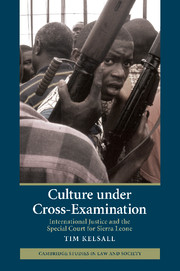Book contents
- Frontmatter
- Contents
- List of illustrations
- Preface
- 1 White man's justice? Sierra Leone and the expanding project of international law
- 2 The story of the CDF trial
- 3 An unconventional army: chains of command in a patrimonial society
- 4 Facts, metaphysics and mysticism: magical powers and the law
- 5 We cannot accept any cultural consideration: the child soldiers charge
- 6 ‘He's not very forthright’: finding the facts in a culture of secrecy
- 7 Cultural issues in the RUF, AFRC and Charles Taylor trials
- 8 Conclusion: from legal imperialism to dialogics
- References
- Index
6 - ‘He's not very forthright’: finding the facts in a culture of secrecy
Published online by Cambridge University Press: 18 January 2010
- Frontmatter
- Contents
- List of illustrations
- Preface
- 1 White man's justice? Sierra Leone and the expanding project of international law
- 2 The story of the CDF trial
- 3 An unconventional army: chains of command in a patrimonial society
- 4 Facts, metaphysics and mysticism: magical powers and the law
- 5 We cannot accept any cultural consideration: the child soldiers charge
- 6 ‘He's not very forthright’: finding the facts in a culture of secrecy
- 7 Cultural issues in the RUF, AFRC and Charles Taylor trials
- 8 Conclusion: from legal imperialism to dialogics
- References
- Index
Summary
As the judges in Trial Chamber One were fond of saying, the Special Court for Sierra Leone was an institution dedicated to finding the facts, and determining the truth or falsity of the charges against the accused. Making this task more difficult, however, was that communication at the Court frequently ran into problems. Sitting in the public gallery during the opening months of the trial, one of the most interesting features of courtroom encounters was, from my observations, their inconclusiveness. Cross-examination in particular was often an extremely laboured affair, counsel frequently failing to get straight answers to their questions. In this chapter I posit that these and other fact-finding difficulties stemmed in part from a cultural valorisation of furtiveness and dissimulation, complicated by other features of the social and cultural context, such as dissonant notions of space and time, inter-ethnic misunderstandings, orality, and the material poverty of many witnesses, not to mention problems of trauma and memory lapse.
SECRECY AND AMBIGUITY IN SIERRA LEONE
The great German sociologist Georg Simmel thought that secrecy was one of mankind's greatest achievements (Simmel 1906, 462). A universal human attribute, secrecy was distributed differently in different types of society. In less developed societies, public offices were often enveloped in secrecy and mysticism, while private individuals, because they tended to live in close proximity to one another, were exposed to a great degree of public prying (Simmel 1906, 468). Secrecy was often used to protect groups that were immature or otherwise insecure, and in new societies, a select group would often establish its dominance by recourse to some secret or lie, which thereafter conferred solidarity and collective efficacy (Simmel 1906, 471, 446).
- Type
- Chapter
- Information
- Culture under Cross-ExaminationInternational Justice and the Special Court for Sierra Leone, pp. 171 - 224Publisher: Cambridge University PressPrint publication year: 2009



